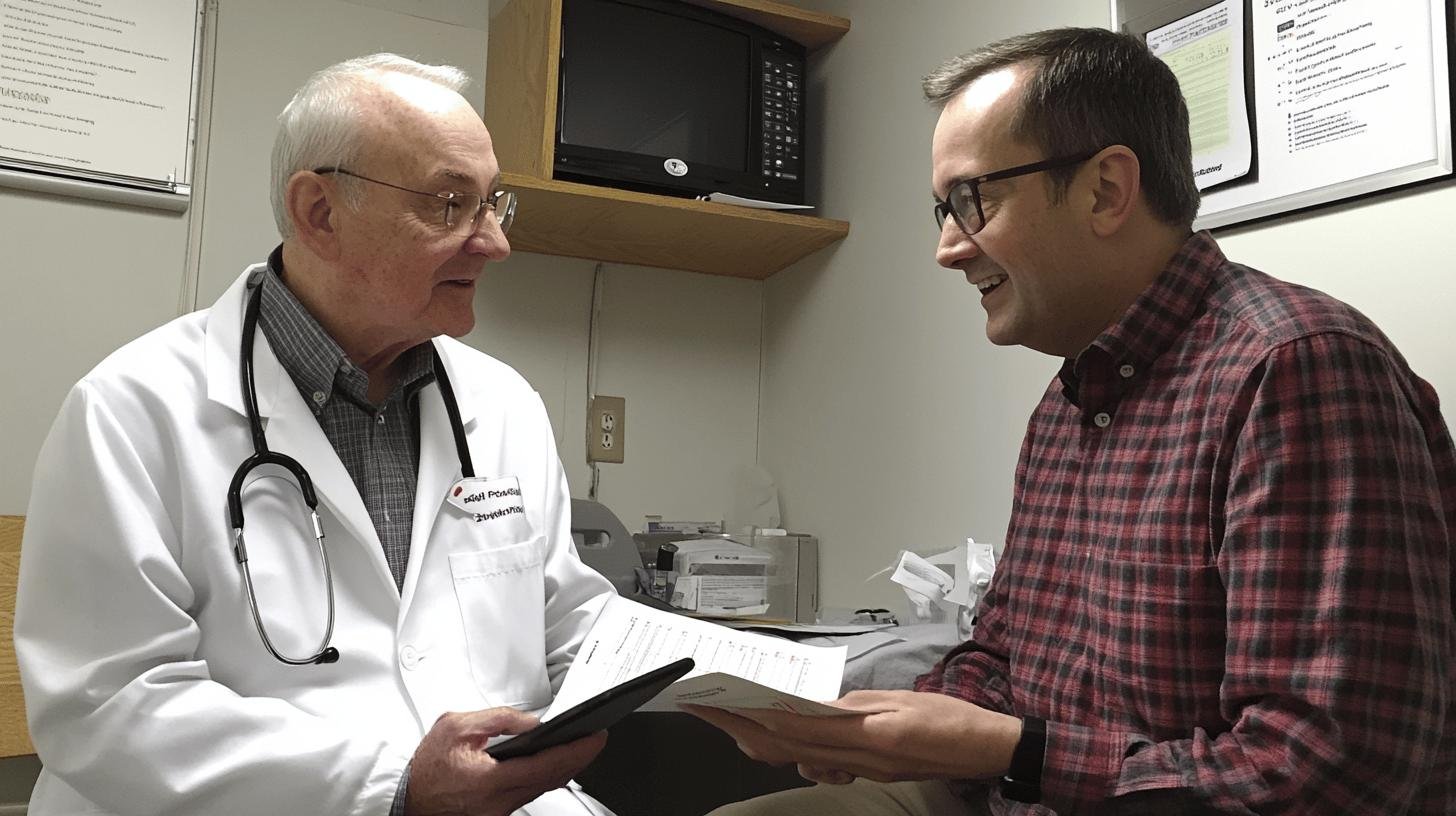TL;DR:
- Direct Primary Care (DPC): Fee-for-service, personalized care with direct doctor payment, convenient access, lower ER visits, and minimal paperwork.
- Medicare: An insurance-based model with comprehensive coverage, complex paperwork, and potential communication barriers.
- Integration Benefits: Better care coordination, increased access, high patient satisfaction, fewer hospital visits, and cost savings.
- Drawbacks: DPC fees are out-of-pocket, compliance challenges for providers, and potential confusion with dual plans.
- Cost Comparison: DPC offers predictable fees, while Medicare covers major expenses but involves claims navigation.
- Key Steps for Medicare Patients: Retain Medicare for major needs, budget for DPC fees, find DPC providers, and coordinate care.
Can Direct Primary Care and Medicare be a match made in healthcare heaven? With the complexities of Medicare and the straightforwardness of Direct Primary Care (DPC), blending the two might seem like mixing oil and water. But what if I told you that combining Medicare’s comprehensive coverage with DPC’s personalized touch could be the secret to a balanced healthcare routine? From fewer hospital visits to better access to your doctor, we’re about to unpack why DPC and Medicare might be the perfect healthcare combo you didn’t know you needed. Let’s get started!
Understanding Direct Primary Care and Medicare
Direct Primary Care (DPC) and Medicare work under different payment models, impacting the patient experience. DPC uses a fee-for-service model, where patients pay a regular fee directly to their doctor. This model allows for personalized attention, longer appointments, and transparent pricing. In contrast, Medicare is an insurance-based fee-for-service model, which often creates barriers to frequent communication and access because of insurance claims and approvals.
DPC excels in offering easy access to doctors, which is crucial as patients age and need more healthcare services. It enables better care coordination, fewer hospital stays, and fewer unnecessary surgeries. While Medicare is comprehensive, it can feel like navigating a maze of paperwork and limited access. It makes DPC a valuable option for those wanting a personalized healthcare experience without the bureaucratic hassle.
Key Points of Each Model:
Direct Primary Care (DPC):
- Fee-for-service payment directly to doctors
- Personalized attention and longer appointments
- Straightforward pricing with no insurance claims
- Better coordination of care
- Convenient access to physicians
Medicare:
- Insurance-based fee-for-service model
- Comprehensive coverage with complex paperwork
- Barriers to frequent communication with physicians
- Extensive coverage for major medical expenses
- Requires navigating insurance claims and approvals
How Direct Primary Care Works with Medicare

Direct Primary Care (DPC) and Medicare can work together like peanut butter and jelly, offering a sweet deal for patients. How do they integrate? DPC provides Medicare beneficiaries easy access to their doctors, ensuring better care coordination. Patients in DPC practices generally have fewer hospital days, ER visits, and unnecessary surgeries. That’s because DPC doctors can focus on you without dealing with insurance claims.
Wonder why DPC patients seem happier? Data shows they’re delighted with their care. They get more time with their doctors and quicker responses to their needs. The convenience of same-day or next-day appointments is a game-changer. So, if you’re a Medicare beneficiary, adding DPC to your healthcare plan can make a huge difference in your overall experience.
Here’s a handy table to compare their integration:
| Aspect | DPC | Medicare |
|————————-|—————————|——————————–|
| Access to Physicians | Easy and Direct | Often Limited by Bureaucracy |
| Coordination of Care | Highly Coordinated | Fragmented |
| Patient Satisfaction | High | Variable |
| Hospital and ER Visits | Fewer | More |
| Paperwork and Claims | Minimal | Extensive |
DPC makes your healthcare journey smoother and more personalized. By cutting out the insurance middleman, you and your doctor can focus on what matters: your health. That’s the kind of care everyone deserves.
Benefits of Combining Direct Primary Care with Medicare
Combining Direct Primary Care (DPC) with Medicare can be like having your cake and eating it. Medicare covers unexpected, big-ticket medical expenses that DPC doesn’t handle, while DPC provides better coordination of care and more access to your physician. This is especially useful for seniors with chronic conditions who need frequent check-ins and personalized attention.
The best part? Patients in DPC practices report lower hospital and ER visits, meaning fewer headaches and more money saved. Imagine not having to juggle multiple doctor appointments and endless insurance paperwork. DPC lets you keep your Medicare for major medical issues while enjoying DPC’s convenience and personalized care.
Key Benefits of Combining DPC with Medicare:
- Better Coordination of Care: Your DPC doctor acts like a healthcare quarterback, syncing all your treatments and medications.
- Increased Access to Physicians: DPC offers same-day or next-day visits, so there are no more waiting weeks for an appointment.
- High Patient Satisfaction: Patients rave about the quality time with their doctors and the overall care experience.
- Cost Savings: Fewer hospital and ER visits mean less money out of your pocket.
- Personalized Attention: DPC doctors focus more on you, not on insurance forms.
- Convenience: Direct phone, email, or text communication with your doctor.
Combining these models gives you comprehensive Medicare coverage and personalized, accessible care from DPC. It’s a win-win for your health and your wallet!
Potential Drawbacks and Considerations

Were you thinking about combining DPC with Medicare? Let’s look at potential drawbacks and considerations. The DPC membership fee is one. Medicare beneficiaries might wonder if they should keep their Medicare coverage. The catch? Medicare doesn’t reimburse the DPC fee, so it’s an out-of-pocket expense you’ll need to budget for, along with your regular Medicare premiums.
Another consideration is the legal landscape. DPC providers must navigate a maze of regulations to stay within Medicare. Compliance with rules like the False Claims Act is tricky and requires meticulous attention. This complexity might deter some providers from opting into Medicare, limiting your choices.
Key Drawbacks:
- Out-of-Pocket Costs: DPC membership fees aren’t reimbursed by Medicare.
- Legal Complexities: Staying compliant with Medicare regulations can be challenging for DPC providers.
- Limited Provider Options: Fewer DPC providers may choose to participate in Medicare due to legal hurdles.
- Dual Plans: Managing both Medicare and DPC plans could be confusing.
- Potential Overlap: Some services might overlap, raising questions about which plan covers what.
By considering these drawbacks, you can make an informed decision about whether combining DPC with Medicare is right for you. Balance the pros and cons to find your perfect healthcare match!
Cost Comparison: Direct Primary Care vs. Traditional Medicare Models
Comparing the costs of Direct Primary Care (DPC) and traditional Medicare models shows that DPC offers straightforward pricing and potential savings. DPC typically involves a regular membership fee covering various primary care services. This fee is paid directly to the doctor, eliminating the need for insurance claims and approvals. Result? More time with your physician and less time dealing with paperwork.
How does this translate to savings? With DPC, you might see fewer hospital days, ER visits, and unnecessary surgeries. Your DPC doctor focuses on preventive care and early intervention, addressing issues before they escalate. This proactive approach can lead to significant cost savings over time, especially for those with chronic conditions needing frequent attention.
Medicare, however, covers major or recurring medical expenses, including most prescriptions. While comprehensive, it involves navigating insurance claims and approvals. This can be time-consuming and sometimes costly if services aren’t fully covered.
| Cost Aspect | DPC | Traditional Medicare |
|————————|——————————–|——————————-|
| Membership Fees | Regular payment to physician | N/A |
| Primary Care Visits | Included in membership fee | Copays and deductibles apply |
| Hospital and ER Visits | Generally fewer, leading to savings | Covered but may have out-of-pocket costs |
| Prescriptions | Not covered by DPC fee | Covered under Medicare Part D |
| Paperwork | Minimal | Extensive |
DPC offers a predictable, potentially cost-effective primary care approach, while Medicare provides comprehensive coverage for significant medical expenses. Understanding these cost differences can help you decide which model best suits your healthcare needs.
Real-World Examples and Case Studies

If you are wondering how Direct Primary Care (DPC) and Medicare work together in real life, here are some success stories. Due to the focus on preventive care and early intervention, patients in DPC practices often have fewer hospital days, ER visits, and unnecessary surgeries.
For instance, Dr. Phil Eskew, a well-known DPC physician, has integrated DPC with Medicare, leading to happier and healthier patients. His approach has resulted in fewer ER visits and hospital stays. Dr. Erika Bliss’s DPC practice also shows remarkable outcomes for Medicare beneficiaries. Patients enjoy longer appointments and easy access to their doctor, improving chronic condition management. Dr. Bliss’s patients report high satisfaction and better overall health due to personalized care.
Key Case Studies:
- Dr. Phil Eskew: Fewer ER visits and hospital stays by integrating DPC with Medicare.
- Dr. Erika Bliss: Improved chronic condition management and patient satisfaction through extended appointments.
- Dr. Robert Lamberts: Enhanced preventive care for Medicare patients, reducing unnecessary surgeries.
- DPC Practice in Kansas: Reduced Medicare beneficiaries’ advanced imaging tests and speciality visits.
These examples demonstrate how combining DPC with Medicare can improve patient outcomes and higher satisfaction.
Navigating Direct Primary Care for Medicare Patients
Navigating Direct Primary Care (DPC) for Medicare patients can feel like a puzzle. Over two-thirds of Medicare beneficiaries have two or more chronic conditions, making high-quality primary care crucial. DPC offers better access and care coordination, which is a win for these patients.
How do you blend DPC with your existing Medicare plan? Use DPC for primary care needs while keeping Medicare for comprehensive coverage. This way, you get the best of both worlds.
Questions and Answers:
- Can I keep my Medicare if I join a DPC practice?
Yes, you can. DPC covers primary care needs, while Medicare handles major medical expenses like hospital stays and specialist visits. - What about the DPC membership fee?
The DPC fee is out-of-pocket and not reimbursed by Medicare. This fee grants direct access to your doctor for primary care services—budget for this fee and your regular Medicare premiums.
Finding a DPC provider is also crucial. Many DPC practices have networks designed for seniors and Medicare beneficiaries, simplifying the process and ensuring you receive the best care.
Key Steps for Medicare Patients Considering DPC:
- Keep Your Medicare Plan: Use it for major medical expenses and emergencies.
- Budget for the DPC Fee: Plan for this out-of-pocket expense.
- Find a DPC Provider: Look for practices catering to seniors and Medicare patients.
- Coordinate Care: Ensure your DPC doctor communicates with any specialists seen through Medicare.
- Ask Questions: Don’t hesitate to ask your DPC provider about handling Medicare-related issues.
These steps can help you integrate Direct Primary Care with your Medicare plan, giving you comprehensive, personalized healthcare.
Final Words
Understanding direct primary care and Medicare highlights how each model uniquely serves patients. DPC offers personalized attention and easy access to your doctor, while Medicare provides extensive coverage for major medical expenses. Both have their benefits and drawbacks.
Combining DPC with Medicare can enhance care coordination, particularly for seniors, giving them the best of both worlds. Real-world examples show that this combo leads to better outcomes and higher satisfaction.
Are you thinking about direct primary care for your healthcare needs? It could be worth exploring, especially if you value personalized and proactive care.
FAQ
Direct Primary Care and Medicare: Pros and Cons
Q: What are the pros and cons of Direct Primary Care and Medicare?
A: Direct Primary Care offers personalized attention and straightforward pricing, while Medicare provides broader coverage. DPC ensures better access to doctors, but it’s a monthly fee. Medicare has more comprehensive coverage but can involve more red tape.
Direct Primary Care and Medicare Reviews
Q: How do people review Direct Primary Care with Medicare?
A: Reviews for DPC combined with Medicare are generally positive, noting better access to doctors and reduced need for ER visits. However, some mention the added DPC fee as a downside.
Finding Direct Primary Care Providers
Q: How can I find Direct Primary Care providers near me?
A: Search online for “Direct Primary Care providers near me” or check DPC directories. Local healthcare networks may also have recommendations.
IRS and Direct Primary Care
Q: How does the IRS view Direct Primary Care?
A: Currently, the IRS doesn’t allow DPC membership fees to be reimbursed through HSA or FSA funds. Always check the latest IRS rules for updates.
Why Opt Out of Medicare?
Q: Why would someone opt out of Medicare?
A: Some opt-out to avoid restriction and regulation complexities or to take advantage of DPC’s more personalized care. Consult your doctor and financial planner first.
Medicare Opt-Out Form
Q: Where can I find the Medicare opt-out form PDF?
A: You can download the Medicare opt-out form from the CMS (Centers for Medicare & Medicaid Services) website.
Is Direct Primary Care Worth It?
Q: Is Direct Primary Care worth it?
A: DPC can be worth it for better access to doctors and fewer ER visits. The fixed monthly fee can also simplify healthcare spending.
Benefits of Direct Primary Care
Q: What are the benefits of Direct Primary Care?
A: Benefits include:
- Unlimited doctor visits
- Direct communication with your physician
- Fewer hospital and ER visits
- Personalized care plans
- Less administrative red tape
Is DPC Membership Worth It?
Q: Is a Direct Primary Care membership worth it?
A: Yes, if you value personalized care and direct access to your doctor. It can also help manage chronic conditions effectively.
How DPC Makes Money
Q: How does Direct Primary Care make money?
A: Direct Primary Care makes money through membership fees paid by patients rather than billing insurance companies. This keeps pricing simple and transparent.
Direct Primary Care and Insurance
Q: What does Direct Primary Care mean in insurance?
A: In DPC, patients pay doctors directly via a monthly fee rather than through insurance. It’s a more straightforward payment model, bypassing insurance claims.
Direct Primary Care and Medicare Integration
Q: How does Direct Primary Care integrate with Medicare?
A: DPC offers Medicare patients better physician access and more personalized care. However, Medicare doesn’t reimburse DPC fees, so keeping both can provide comprehensive coverage.
Navigating Direct Primary Care for Medicare Patients
Q: How can Medicare patients navigate Direct Primary Care?
A: Maintain Medicare for major medical expenses. Use DPC for primary care to get better access and coordination. Always communicate with both your DPC provider and Medicare.

